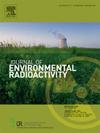Assessment of radon risk awareness among undergraduate students at Mkwawa University College of Education, Tanzania
IF 2.1
3区 环境科学与生态学
Q3 ENVIRONMENTAL SCIENCES
引用次数: 0
Abstract
Radon is a by-product of decayed uranium and thorium isotopes, which are naturally occurring radionuclide with extremely long half-lives. It is rated as the second cause of lung cancer after tobacco cigarette smoking. This study assesses knowledge and awareness of health risks associated with radon among undergraduate students at Mkwawa University College of Education (MUCE) by using questionnaires. A structured questionnaire with 36 items was administered to 403 respondents at MUCE. Information was collected on the demographic variables of the respondents as well as knowledge and awareness of health risks associated with radon among undergraduates at MUCE. Data were analysed by using descriptive statistics. Respondents included 204 (50.6 %) females and 199 (49.4 %) males. Findings revealed that 257 (63.8 %) of the respondents had no knowledge of radon gas and had not even heard about it before this study, while only 146 (36.2 %) of the respondents had heard about radon gas. Moreover, 285 (70.7 %) of the respondents were not aware that radon gas can cause health effect, and only 118 (29.3 %) of the respondents were aware about health effect of radon gas. Likewise, only 145 (36 %) of the respondents were aware about the risks of radon gas, while 258 (64 %) of the respondents were not aware about the risk of radon as the second cause of lung cancer after tobacco smoking. This study suggests the need to increase public education and awareness campaigns on radon and its associated risks.
坦桑尼亚姆瓦瓦大学教育学院本科生氡风险意识评估
氡是铀和钍同位素衰变的副产品,这两种同位素是自然产生的半衰期极长的放射性核素。它被认为是继吸烟之后导致肺癌的第二大原因。本研究通过问卷调查评估了姆瓦瓦大学教育学院本科生对氡相关健康风险的知识和意识。一份包含36个项目的结构化问卷被发放给北京大学的403名回答者。收集了关于答复者的人口统计变量以及北京大学本科生对氡相关健康风险的知识和认识的信息。资料采用描述性统计进行分析。受访者中女性204人(50.6%),男性199人(49.4%)。调查结果显示,257人(63.8%)在调查前对氡气一无所知,甚至没有听说过氡气,而只有146人(36.2%)听说过氡气。此外,285人(70.7%)不知道氡气对健康的影响,只有118人(29.3%)知道氡气对健康的影响。同样,只有145名(36%)答复者了解氡气的风险,258名(64%)答复者不了解氡是仅次于吸烟的第二大肺癌原因的风险。这项研究表明,需要加强关于氡及其相关风险的公众教育和宣传运动。
本文章由计算机程序翻译,如有差异,请以英文原文为准。
求助全文
约1分钟内获得全文
求助全文
来源期刊

Journal of environmental radioactivity
环境科学-环境科学
CiteScore
4.70
自引率
13.00%
发文量
209
审稿时长
73 days
期刊介绍:
The Journal of Environmental Radioactivity provides a coherent international forum for publication of original research or review papers on any aspect of the occurrence of radioactivity in natural systems.
Relevant subject areas range from applications of environmental radionuclides as mechanistic or timescale tracers of natural processes to assessments of the radioecological or radiological effects of ambient radioactivity. Papers deal with naturally occurring nuclides or with those created and released by man through nuclear weapons manufacture and testing, energy production, fuel-cycle technology, etc. Reports on radioactivity in the oceans, sediments, rivers, lakes, groundwaters, soils, atmosphere and all divisions of the biosphere are welcomed, but these should not simply be of a monitoring nature unless the data are particularly innovative.
 求助内容:
求助内容: 应助结果提醒方式:
应助结果提醒方式:


